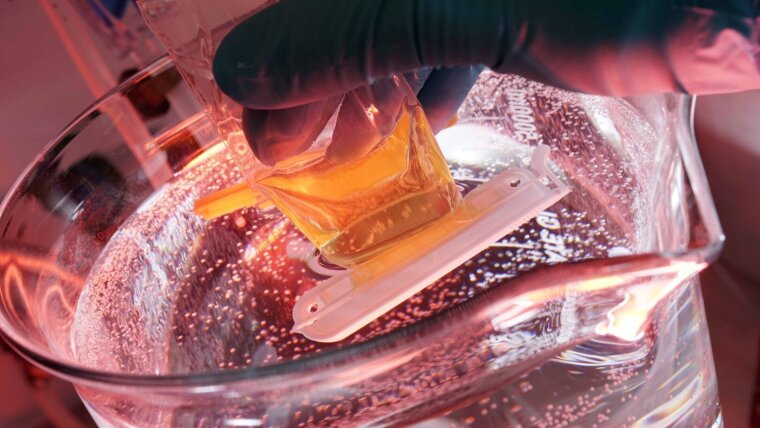
- Light
- Research
Published: | By: Axel Burchardt
Just one look in the yellow bin reveals a colourful jumble of different types of plastic. However, the purer and more uniform plastic waste is, the easier it is to recycle. In a new research project, the universities of Jena and Bayreuth, together with the companies BASF, Endress + Hauser Digital Solutions and TechnoCompound GmbH, want to optimise the recycling process for plastics. The SpecReK (Spectroscopic Investigation of the Recycling of Plastics) project plans to reliably and precisely identify the composition of plastic waste during the recycling process to improve the quality of the recycled plastic. State-of-the-art measurement techniques will be applied and combined with artificial intelligence (AI).
Strengthening the circular economy for plastics
The majority of plastic waste that goes into the recycling process today is currently recycled mechanically. The waste is collected, sorted, shredded, cleaned and then melted down. The melt contains different types of plastic, additives and impurities, depending on the source material and the sorting process. As a result, the quality of the recycled material varies in many cases, making it difficult to produce high-quality plastic products from it again. "With the increasing demand for high-quality recycled materials, it is crucial under the current legal requirements to precisely understand the material properties and composition of mechanically recycled plastic waste and to optimise the process. This will strengthen the circular economy," declares Dr Bernhard von Vacano, head of the Plastics Circularity research programme at BASF, which is the consortium leader of SpecReK.
Analysing materials in real time
The project aims to utilise the interaction of light and material to obtain information about the chemical structure of recycled plastics. Using spectroscopic methods, the researchers want to determine in real time which types of plastic, additives and impurities are present in the material mixture. In the next step, an AI algorithm will recognise patterns in the measurement data and suggest which other components should be added or how the recycling process should be adapted to improve the quality of the recycled plastic.
"At the moment, we don't have the necessary analytical tools to determine exactly which components are present in the mechanically recycled plastic during the reprocessing," says Bernhard von Vacano. However, this information is necessary to be able to assess and improve the quality of plastic waste.
In the joint project, which is funded by the Federal Ministry of Education and Research with more than one million euros in the Quantum Systems programme, the industrial partners and the universities are working hand in hand. The two participating research groups at Friedrich Schiller University Jena in Germany are contributing their expertise in the field of polymer research, robot chemistry as well as AI and data science to the consortium. "The use of state-of-the-art robotic chemistry in Jena combined with the characterisation of different polymers and their impurities allows large amounts of data to be collected efficiently," explains chemist and materials scientist Prof. Dr Ulrich S. Schubert. "This data is essential for the use of machine learning methods in order to recognise patterns in the data and enable real-time analysis," adds Jena data scientist Prof. Dr Thomas Bocklitz. "This combination is the only way to improve the recycling rate and the quality of the recycled polymer. New applications for recycled plastic are then also possible," emphasises Prof. Schubert.